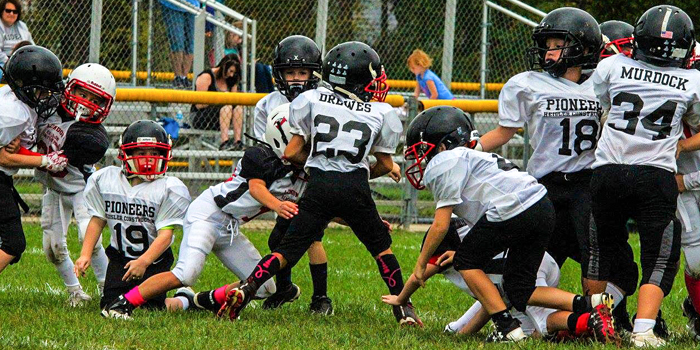
Parent: "Hi, I'd like to get some speed work for Johnny, my seven-year-old who plays football."
Me: "Great! That's awesome. Our sessions consist of 30 minutes of fundamental skills and 30 minutes of organized resistance training. This includes push-ups, pull-ups, and some light weightlifting to help Johnny engrain proper movement patterns."
Parent: "I don't want Johnny lifting weights. It will stunt his growth."
This is a conversation that I have had with many parents over the years. Now, I firmly believe that if a child is ready to engage in any type of sporting activities that they are ready to participate in some type of organized resistance training. Kids today can’t even run or jump properly, but hey, let's strap a helmet on little Johnny and have him run full force into another seven-year-old while avoiding a goblet squat with little Johnny holding a 15-pound kettlebell because it'll stunt his growth.
RECENT: The Five Exercise Assignment
As a strength coach, it is our duty to provide our athletes with the right skills and tools at the right time during their development in order to succeed at their sports. If we don't then we have failed to do our jobs. Focusing on fundamental skills at a young age will set our athletes up for success when it matters most. Remember, nobody cares that your 12-year-old's AAU team was undefeated. One of the issues is that most youth coaches don’t know proper patterns. They don’t know how to coach kids on how to properly run and jump. Coaches just tell the kids to run faster and jump higher. Don’t you think they would do that if they could?
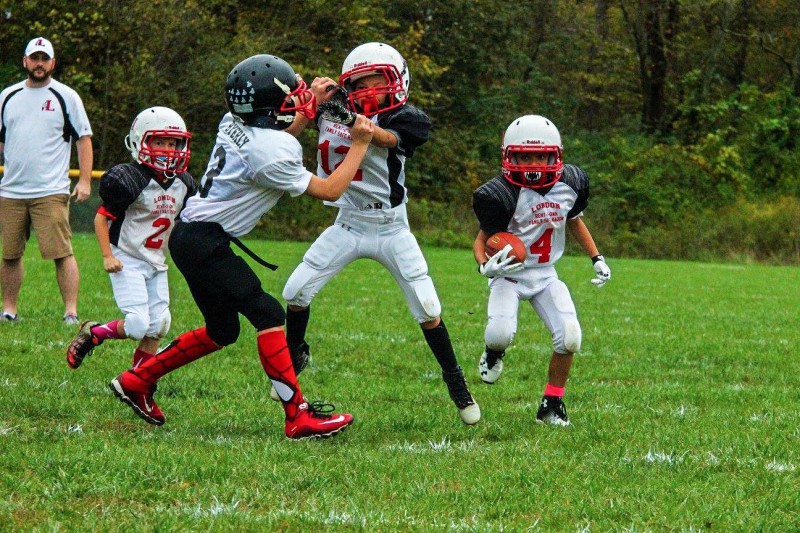
A lot of articles have been written by strength coaches about how bad it is to specialize our youth athletes and remembering that back in the day kids played four sports. What are you, as a coach, doing to solve this problem? I see a lot of complaining on Facebook. Especially this time of year, it’s the same two articles. Look how many football players in the National Championship or the Super Bowl played multiple sports in high school. Many of you will post that this year with something along the lines of, “See, I told you! Play multiple sports and you’ll be a better athlete.” You'll get some likes and you and your strength coach buddies will congratulate each other with a, "Preach, brother!” or a, “Right on, been saying this for years!” And yet nothing has changed.
What have you actually done to help solve this problem? Have you educated parents, administrators, and sport coaches on how important it is? Have you held free fundamental skills camps for the youth athletes in your area? Maybe you don’t know how or you don't know what to do — and if so, that’s okay. My goal with this series is to give you the tools you need to educate those groups. If we want to see change, we have to be in this together. We have to work together because little has been done to provide coaches who work with youth athletes the resources they need to be successful. Most are doing the best that they can with what they have, but as strength coaches to bring forth the change that we know needs to happen, we need to educate instead of complaining on our next status update.
The United States is behind a lot of countries in the development of our young athletes. We place too much emphasis on competition and winning at a young age that it’s becoming detrimental to our athletes. Stop imposing adult competition on kids. It's engraining a fear of losing. Who at a young age wants to participate in anything if they know they have a chance of losing? Nobody likes to lose, especially a young kid. Here come the responses of, “Well, kids need to learn the difference between winning and losing” and the, “Not everybody is a winner” crowd.
Look, I’m not advocating that everyone gets a trophy, nor that everyone is a winner, because that's not how life works. I'm a big believer in competition and teaching kids that you can't win everything. But it's about how this information is delivered. Sport coaches train their athletes based on the game. Instead of making it about who has the highest amount of points for scoring a goal, make their competitions skill-based so that youth coaches will have to train skills instead. You can still play the same games, but just change the delivery a little bit. We can slowly introduce the basic rules and ethics of sports at this age.
Understand that if you’re a coach who works with young athletes, their interaction with you will have a lifelong effect. If you treat a kid poorly or if they have a bad time with you as a coach, they may never play sports again. They may end up living a sedentary lifestyle because they are afraid to do anything. They are so paralyzed with fear of losing because of that one time as a 12-year-old their coach ruined sports for them.
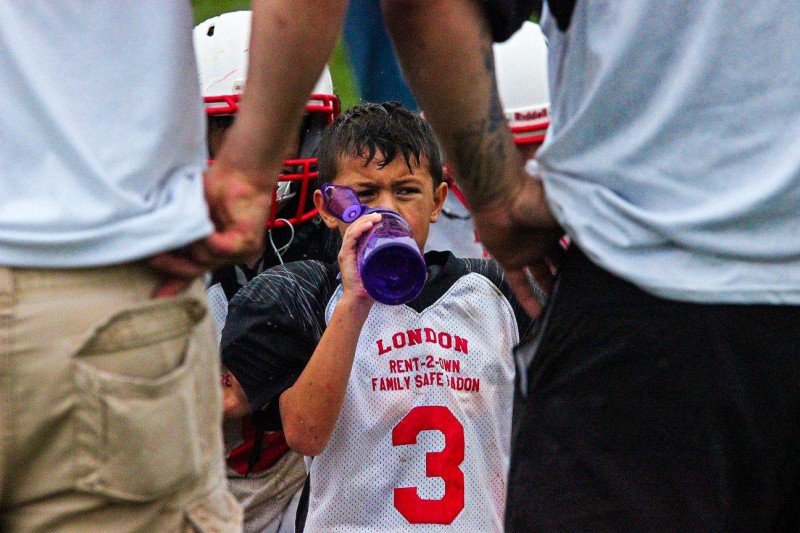
I don’t think a lot of youth coaches think about the power and influence they have on young athletes. Most of us played sports because they were fun, we loved the game, and we got to play with our friends. I valued all of those ahead of winning. Don't get me wrong, I love winning. But losing is just as important—if not more important—than winning. Losing teaches lessons. It teaches adversity. Nelson Mandela said, "I don't lose. I either win or I learn." That's a lesson we need to be teaching our young athletes.
Kids need to learn that they will fail and that how you handle failure is what makes you a winner. Long term, this will set those kids up for success more than anything. Remember, this article is geared toward athletes who are six to nine years old — not high school and college athletes. Learn and get better.
I know I almost quit sports because of a coach that belittled me and made me feel like I was worthless as I missed a "game-winning shot" as 13-year-old. In the grand scheme of things, that shot didn't matter and that coach probably doesn't remember, but I still do, over 15 years later. I quit basketball and never stepped foot on a court again. The coach could have instead pulled me to the side and used it as a learning experience. I didn't quit sports altogether, but that coach ruined basketball for me. I feel some of you reading this can think back to that one coach that made you feel like you didn't matter. So understand that when coaching athletes between the ages of three and 13, we need to be focusing on developing the athlete as a whole. That includes mentally and physically.
MORE: What We Can Do Better for Youth Sports
The first thing we need to understand is that most speed and strength gains in young athletes are due to motor learning, improved motor coordination, and nervous system development/adaptation. A young athlete's central nervous system is 95% developed by the age of seven. Let that sink in for a minute. That is why, when an athlete is young, it is the best time to develop these fundamental athletic skills. There are also periods during an athlete's life when they can actually learn skills more efficiently and effectively than at other times. Moral of the story is, if you want to specialize your athletes at a young age then specialize them in fundamental movement patterns.
Joe DeFranco said it best: "A young athlete’s nervous system is like clay and needs to be molded.” I’ll take that one step further, though. Think of the young athlete's nervous system like clay. It’s soft and pliable. But as the athlete ages, the clay begins to harden. The clay hardening is the athlete’s patterns becoming more engrained. Whether these patterns are right or wrong, they become engrained. And it’s extremely hard to fix bad patterns.
All of us know that young athletes don’t get enough unorganized play. Specialization at a young age is what I consider to be almost an epidemic. Every youth athlete should engage in as much activity as possible. They have to. They don't need a pitching coach, a batting coach, a speed coach, and a strength coach. I've had athletes come in and their parents ask, "How can we make Johnny a better athlete?" I tell them, "Let him be a kid and go play." But, parents don't do that. They think they have the next all-star on their hands, so what we have to do is our jobs.
Skills
The following skills are the building blocks for the overall development of a youth athlete. They form the foundation of human development. Without them, the athlete will have no foundation for sports skills and will be behind other athletes. Consider it like learning basic math skills: we need to learn to add and subtract before we can multiply and divide, just like a child needs to learn to crawl before they can walk. If they don’t develop these skills they may learn improper movement patterns, leading to injury, and they may just end up giving up on sports altogether, contributing to the obesity epidemic.
Stability
Stability is the ability to sense a shift in the relationship of the body parts that alter one's balance, as well as the ability to adjust rapidly and accurately for these changes with the appropriate compensating movements. This includes, but is not limited to, the following:
- Rolling
- Dodging
- Balancing
- Turning
- Stopping
- Swinging
- Collapsing
- Swaying
Locomotor
Locomotor skills involve movements that are responsible for moving the body from one place to another. This includes, but is not limited to, the following:
- Walking/Running
- Jumping
- Skipping/Galloping
- Climbing
- Fleeing
- Shuffling
Manipulative
Manipulative skills are movements that are responsible for sending away, receiving, or traveling with an object. This includes, but is not limited to, the following:
- Throwing
- Catching
- Kicking
- Striking
- Volleying
At this age, there should be no organized strength training, meaning keep them out of the weight room. Everything should encompass basic movements like those listed above and should typically be game-based. If these kids aren't having fun, they will be quick to disengage.
Do not put a focus on winning and losing at this age. Instead, turn it into a game of how well the athlete is progressing in their movement skills. Reward them for their technique. My favorite cues are to "own the position" or "win the position." They should be exposed to as many possible movements in a safe and challenging environment. Kids have vivid imaginations, so take advantage of that. Get creative. This is such an important time in their life. Please let them be kids.
One of the best ways for these kids to learn and apply their skills is through small-sided games. The small-sided game is the little brother of the actual game. They will allow you to recreate the physical demands found in gameplay but in a smaller setting. Think of football. Instead of playing a full 100 yards with 22 seven-year-olds, cut the field in quarters and use the sidelines as your end zones. But here's the cool thing with small-sided games: you use smaller teams, which leads to an increase in participation, which leads to an increased number of chances that athletes will have to use the newly acquired skills and apply them. The more we do something under the watchful eye of a good coach, the better we get. This leads to an increase in success and enjoyment of the game being played, which then leads to more competent athletes and a feeling of success. When we are successful at something, we tend to want to continue doing it.
Sample Program
Keep everything fun. This age group should be having a blast when they train with you. Everything should be game-based. Think of it as organized chaos.
Day 1
- Rolling and dodging
- Swaying and shuffling
- Climbing
- Jumping and landing
- Small-sided game incorporating all of these skills
Day 2
- Walking/running, stopping and turning
- Fleeing
- Swinging (not a bat)
- Catch, throw, and kick
- Small-sided game incorporating all of these skills
Please, no long distance running and "mental toughness" workouts. That engrains exercise as punishment. Don't do it. This is not the time, not the place, not the age. Keep everything under five seconds besides the small-sided games.
Photo credit: Chris Whitacre of London Football Gridiron Club










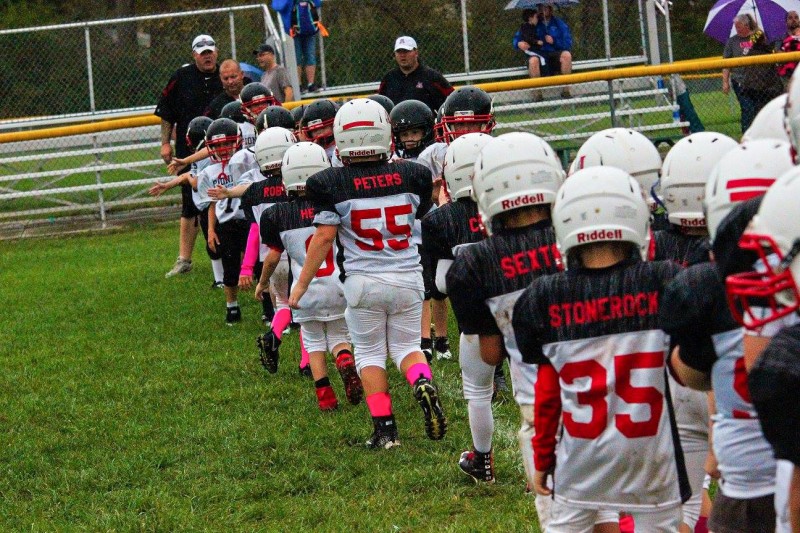
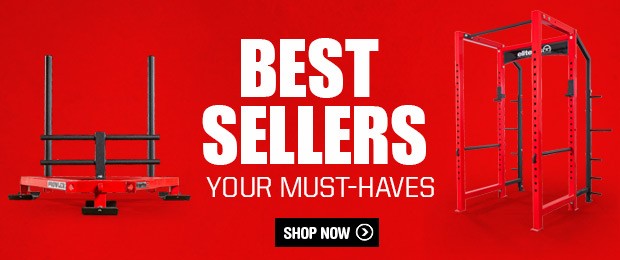
First off, I'm so glad I've stumbled upon your articles as a whole. These are a goldmine. I really liked your aerobic capacity for athletes one.
I know this is an older thread but would you be able to elaborate on / give examples (links would be fine if you have them handy) to what you mean by swaying and swinging. I'm imagining swaying as being almost a tai chi type thing and swinging as like swinging a bat or a golf club but without the bat/club. Is that the sort of thing you mean?